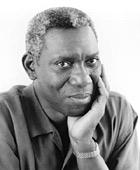Born 1947 and raised in Bogalusa, Louisiana, Komunyakaa served in Vietnam as an information specialist, saw combat, and received the Bronze Star. A graduate of the University of Colorado, he also received master's degrees from the University of California, Irvine, and Colorado State University. After teaching at the University of New Orleans, Komunyakaa was a professor at Indiana University for over ten years, and, in the fall of 1997, he began teaching at Princeton University.
Yusef Komunyakaa is professor in the Council of Humanities and Creative Writing at Princeton University. Wesleyan has published six of his ten books, including the Pulitzer prize-winning Neo Vernacular (1993), which also won the Kingsley-Tufts Poetry Award from the Claremont Graduate School, magic City (1992), and Dien Cai Dau (1988).
In 1991, he won the Thomas Forcade award, in 1993 was nominated for the Los Angeles Times Book Prize in Poetry, in 1994 received the William Faulkner Prize from the University of Rennes in France, and in 1997 he was awarded the Levinson Prize from Poetry magazine and the Hanes Poetry Prize. His new book from Wesleyan is Thieves of Paradise.
Pulitzer prize-winning poet (1994) Yusef Komunyakaa is a unique figure in American poetry and the author of eleven poetry volumes. Komunyakaa's poetry is celebrated for its short lines, its simple vernacular, its jazzy feel, and its rootedness in the poet's experience as a black of the American South, and as a decorated veteran of the Vietnam War.
Komunyakaa's most recent collection is Talking Dirty to the Gods (2000), and his earlier collections include Thieves of Paradise (1998), University Press of New England), which was nominated for the National Book Critics Circle Award, Neon Vernacular (1993), which received the Pulitzer Prize, Magic City (1992) and Dien Cai Dau (1988).
In 1999, Yusef Komunyakaa was elected a Chancellor of the Academy of American Poets, In addition to his many publications and poetry collections, he is co-editor (with Sascha Feinstein) of two volumes of "The Jazz Poetry Anthology" from Indiana University Press. Komunyakaa was a visiting writer at the Writers Institute on March 8, 2001.
Yusef Komunyakaa's poems have aptly been described as "razor-sharp pieces that tell us more about our culture than any news broadcast," Toi Derrcote, focusing on the poet's aesthetic, has written that "Komunyakaa's poetry is about art, about how it alters reality, how it changes the past, and how it is both a desperate and a redemptive act" and Komunyakaa has claimed that "language is what can liberate or imprison the human psyche" and that "we are responsible for our lives and the words we use."
"In the pantheon of poetic stereotypes--the vitriolic, passionate drunkard is one; the wry, acerbic loner another--Mr. Komunyakaa . . . is more the dreamy intellectual, a Worthsworthian type whose worldly, philosophic mind might be stirred by something as homely and personal as a walk in a field of daffodils." -- Bruce Weber in The New York Times
' . . . a remarkable set of 132 four-quatrain poems that erase distinctions between nature, humanity and the divine . . . Life in its spectacular variations inspires quirky ruminations on such earthly creatures as slime molds and hyenas, and such mythological beings as the centaur and Janus, the two-faced god." Kirkus Reviews said that "Here Komunyakaa comes across as a poet of both the small and the grand, a visionary who considers Eros and maggots with equal insight." --Booklist on Talking Dirty to the Gods
"Yusef Komunyakaa is a poet of the human heart in all its joys and horrors, fiercely present as it pounds away at the center of every human being's consciousness. He enlarges our idea of what poetry is, challenging us to go beyond our own narrow definitions."--The Washington Post Book World on Thieves of Paradise
Source: www.albany.edu/writers-inst/komunyakaayusef.html
and Kenyon Review, Summer/Fall 1998, Vol. 20 Issue 3/4, p. 5, 16p. |






